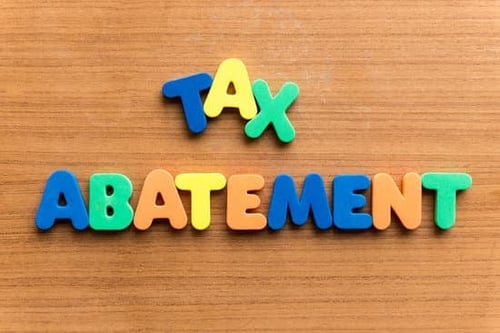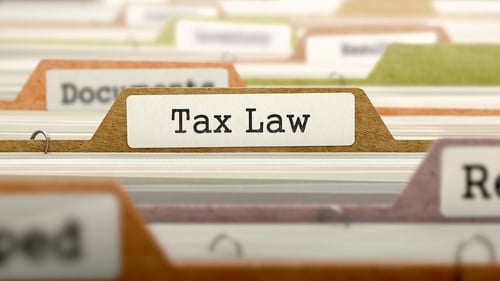Powell Tax Law Blog

What to Do If a Spouse Leaves You with a Surprise Tax Debt?
The United States divorce rate fell to a 50-year low in 2019, but even with that decline it still left 1.5 million Americans reeling from the, often unpleasant, dissolution of their marriages.
“Divorce in America has been falling fast in recent years, and it just hit a record low in 2019. For every 1,000 marriages in [2019], only 14.9 ended in divorce, according to the newly released American Community Survey data from the Census Bureau,” reported the Institute for Family Studies. “It is likely that divorce may increase a bit after COVID-19 because of the pent-up demands, but the overall decline in divorce appears to be a consistent trend.”
Despite this trend there were some 750,000 divorces in 2019, which means a lot of couples breaking their “for better, for worse, for richer, for poorer …” vows.
And it’s often that “for richer, for poorer” part that can be a financial gut punch for splitting spouses.
Divorce Can Shine a Light on “Money Secrets”
One of the joys of being married is the feeling of “what’s mine, is yours and what’s yours, is mine” … but in divorce that can be quite a legal liability.
Divorce often shines a light on “money secrets” that one spouse was keeping from the other from gambling debts to shopping addictions to hidden bank accounts to financial shenanigans that can often get you in trouble with the Internal Revenue Service (IRS).
“Maybe the spouse has been hiding money. Maybe assets that were supposed to be there, aren’t there anymore. Maybe there were loans taken out against stock portfolios or retirement accounts. Maybe there are back taxes due. I could go on and on,” Jeffrey Landers, author of “Divorce: Think Financially, Not Emotionally” told Hella+Life.
A survey by Worthy (Building a Financial Fresh Start) of 1,785 adult women in three stages of divorce – divorce on the horizon, during divorce and already divorced – found that it is not unusual for a spouse to not comprehend the full financial picture in a marriage.
One of the six surprises these divorced spouses encountered was, according to Market Watch, being unaware of the total size of their marital debt including the primary mortgage, home equity line of credit, auto financing, credit card debt, 401(k) loans, and student loans.
The survey found that almost 1 in 4 spouses relinquished all long-term financial responsibility to their spouse including one who said: “Throughout my marriage, I took a back seat when it came to finances … Somewhere along the way I made the decision to hand over all financial related issues and decisions … I turned a blind eye …”
Unfortunately, turning a blind eye and being unaware is not a defense when it comes to IRS debt accumulated while you file joint tax returns.
“My Spouse Lied to the IRS and I Got the Bill!”
Many spouses are surprised to learn that they are being held accountable for IRS tax debt, even when their spouse took full responsibility for filing their joint tax returns.
This is often known as the “my spouse lied to the IRS, and I got the bill!” moment!
Fortunately, there is a way for the “wronged spouse” to seek help, including using the “innocent spouse relief” rule.
While “innocent spouse” may sound like a film noir airing on Turner Classic Movies, it is a law first passed by Congress in 1971 (Innocent Spouse Act) and strengthened in 1998 (IRS Restructuring and Reform Act of 1998).
“The innocent spouse rule is one of three types of relief offered by the IRS from the joint and several liability of a joint tax return,” says Cornell Law School’s Legal Information Institute. “The rule provides for relief from responsibility for paying tax, interest, and penalties resulting from erroneous items reported by the applicant’s current or former spouse on their joint return.”
3 Types of Relief from Joint Tax Return Debt
The IRS says that “many taxpayers choose to file a joint tax return because of certain benefits this filing status allows them.”
On the flip side, both parties signing the joint tax return are responsible and liable for the filing.
IRS publication “Topic No. 205 Innocent Spouse Relief” says: “When filing jointly, both taxpayers are jointly and severally liable for the tax and any additions to tax, interest, or penalties that arise from the joint return even if they later divorce.”
In other words, joint and several liability means that each taxpayer is legally responsible for the entire liability.
“Thus, both spouses on a married filing jointly return are generally held responsible for all the tax due even if one spouse earned all the income or claimed improper deductions or credits. This is also true even if a divorce decree states that a former spouse will be responsible for any amounts due on previously filed joint returns,” says the IRS.
In some cases, however, a spouse can get relief from being jointly and severally liable.
There are 3 types of relief offered:
- Innocent Spouse Relief: Provides you relief from additional tax you owe if your spouse or former spouse failed to report income, reported income improperly, or claimed improper deductions or credits.
- Separation of Liability Relief: Provides for the separate allocation of additional tax owed between you and your former spouse or your current spouse you're legally separated from or not living with, when an item wasn't reported properly on a joint return. You're then responsible for the amount of tax allocated to you. Refunds aren't available under separation of liability relief.
- Equitable Relief: This may apply when you don't qualify for innocent spouse relief or separation of liability relief for something not reported properly on a joint return and generally attributable to your spouse. You may also qualify for equitable relief if the amount of tax reported is correct on your joint return but the tax wasn't paid with the return.
“There are many conditions that apply to each of the three types of relief claims, and it requires a thorough knowledge of the laws and rules that apply to each claim,” says Steve Powell of Powell Tax Law.
Powell notes that you must request innocent spouse relief or separation of liability relief no later than 2 years after the date the IRS first attempted to collect tax from you.
“For equitable relief, you must request relief during the period of time the IRS can collect the tax from you,” added Powell. “If you're looking for a refund of tax you paid, then you must request it within the statutory period for seeking a refund, which is generally three years after the date the return is filed or two years following the payment of the tax, whichever is later.”
Conditions to Qualify for Innocent Spouse Relief
The IRS says all the following conditions must be met to qualify for innocent spouse relief:
- You filed a joint return that has an understatement of tax that's solely attributable to your spouse's erroneous item. An erroneous item includes income received by your spouse but omitted from the joint return. Deductions, credits, and property basis are also erroneous items if they're incorrectly reported on the joint return
- You establish that at the time you signed the joint return, you didn't know, and had no reason to know, that there was an understatement of tax and
- Taking into account all the facts and circumstances, it would be unfair to hold you liable for the understatement of tax
Requirements to Qualify for Separation of Liability Relief
The IRS says that to qualify for separation of liability relief, you must have filed a joint return and must meet one of the following requirements at the time you request relief:
- You're divorced or legally separated from the spouse with whom you filed the joint return
- You're widowed, or
- You haven't been a member of the same household as the spouse with whom you filed the joint return at any time during the 12-month period ending on the date you request relief
“The IRS rules state you must also not have had actual knowledge of the item that gave rise to the deficiency at the time you signed the joint return, unless you can show that you signed the return under duress,” says Powell.
Last Hope: Qualifying for Equitable Relief
For those who cannot get relief from an innocent spouse or separation of liability ruling, there is still hope in the form of equitable relief.
“To qualify for equitable relief, you must establish that under all the facts and circumstances, it would be unfair to hold you liable for the deficiency or underpayment of tax,” says the IRS.
In addition, you must meet the other requirements listed in Publication 971, Innocent Spouse Relief.
See Revenue Procedure 2013-34 for additional information about qualifying for equitable relief, including how the IRS will consider abuse and financial control by the other spouse in determining whether equitable relief is warranted.
Contact Powell Tax Law today to learn if you qualify for innocent spouse relief, separation of liability relief or equitable relief, and what steps you need to take next.







